Christian Eriksen: Dad back playing football after cardiac arrest
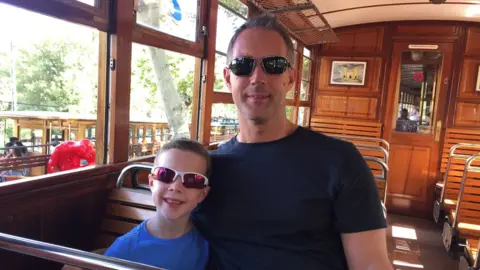 Andrew Barnett
Andrew Barnett"I died on the pitch for six minutes and I am playing football again."
Andrew Barnett from Cardiff collapsed in front of his son in 2018 and said had there been no defibrillator near by, it could be very different picture.
It comes as a charity received hundreds of applications following Christian Eriksen's cardiac arrest while playing for Denmark at Euro 2020.
Calon Hearts said defibrillators should be mandatory as cardiac arrest could "happen to anyone".
'Defibs worth their weight in gold'
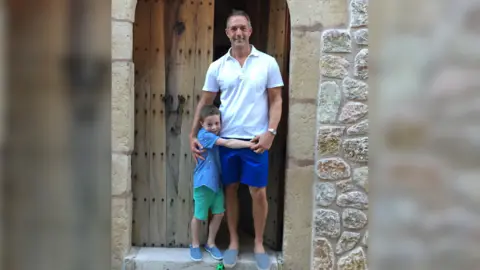 Andrew Barnett
Andrew BarnettAndrew Barnett suffered a cardiac arrest while playing a Christmas special football game with his children.
The 47-year-old told BBC Radio Wales it was "extremely hard" and "shocking" to see Christian Eriksen collapse on Saturday.
"One minute you're on your feet and the next you're literally down on your face, and that's what happened to Christian, unfortunately. So it was really hard to watch," he said.
"[What happened to me] was not on the global stage unfortunately but it was similar, it was in a football match, playing with children and and parents. I was running down the pitch and literally just face-planted.
"I didn't know anything about it, there was nothing, no signals before - that's probably the most worrying part of it, that you don't get any sort of indication it might happen."
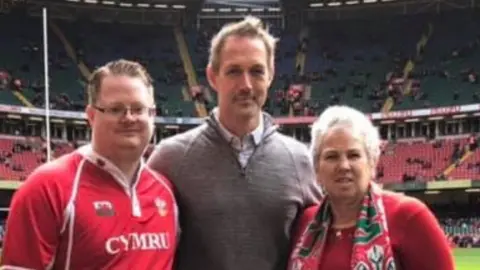 Andrew Barnett
Andrew BarnettAndrew was saved, first by CPR, but then two staff at a nearby leisure centre who used a defibrillator.
He said the speed with which someone gets CPR and then a defibrillator was "absolutely key to the outcome" and backed them being readily-available to the public.
He added that his son has shown an interest in CPR since the incident and it needs to be taught more widely in schools.
Schools in Wales will be expected to teach lifesaving skills and first aid under the nation's new curriculum by 2022.
Andrew said: "If you look at what happened to Christian and if that was in a school, for example, and people don't have the training then the outcome might not have been the same - he was incredibly lucky.
"The defibs are worth their weight in gold."
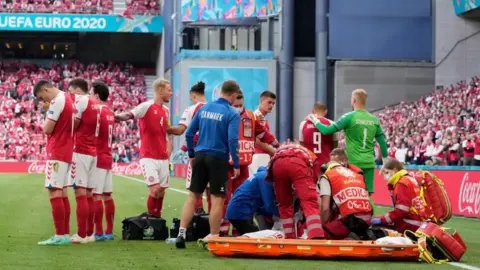 Getty Images
Getty ImagesA cardiac arrest is different to a heart attack as it is a symptom that stops the heart from beating, according to the NHS.
Fewer than 1 in 10 people survive an out-of-hospital cardiac arrest in the UK.
Sharon Owen of Calon Hearts Defibrillators Wales said Eriksen's collapse was "simply awful" and "outlines everything we've been trying to do as a charity for years".
She added that cardiac arrests could "happen anywhere to anyone - every school, sports club, university, work place, recreational place should have one".
She said requests had been coming in in their hundreds - most of which were from amateur sports clubs.
"If you go into cardiac arrest without a defibrillator you have only 7% chance of survival, if a defib is on the patient within three minutes, the chance of survival is over 70%.
"People think it'll never happen to them but it's something than happens sadly to too many young and sporty people."
She said the Welsh government deadline of 2022 for CPR training was "too late" and defibrillators needed to be mandatory as there were 8,007 cardiac arrests outside of hospitals in Wales last year with a survival rate of 3%.
A Welsh government spokeswoman said: "We have provided funding to the Save a Life Cymru campaign, which is working with organisations across Wales to raise awareness of the importance of CPR training and the use of defibrillators through the Touch Someone's Life campaign.
"The number defibrillators in communities and buildings across Wales is increasing constantly and we would encourage people to register them with the ambulance service."
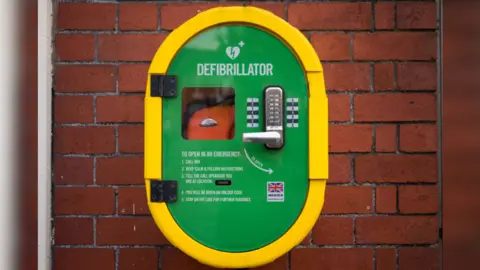 Getty Images
Getty Images'I felt a bit sluggish'
Kevin Martin, 58, from Pontypridd suffered a heart attack and cardiac arrest during his weekly five-a-side football game.
Thanks to the centre's defibrillator and quick thinking from his teammates, he was kept alive until paramedics arrived.
That was eight months ago. Now Kevin, who works as a postal delivery worker, is returning to the team he has been a part of for more than 40 years.
For the first time since his cardiac arrest, Kevin is returning to Gol, the football centre where fellow players saved his life.
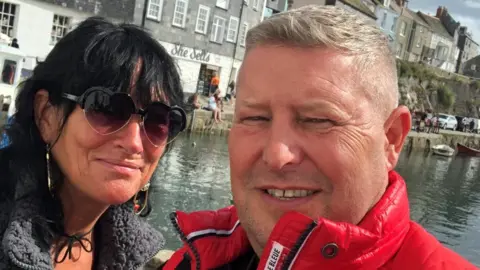 Kevin Martin
Kevin MartinSpeaking about his last game, Kevin said: "I had been playing five-a-side football once a week most of my adult life. That particular day I felt a bit sluggish, but put it down to indigestion.
"Just before half-time I collapsed and crumbled to the ground. I'm told the chaps on the pitch started doing CPR on me immediately and then staff at Gol managed to get the defibrillator over.
"These actions saved my life and I'm forever grateful for it. With my recovery going well, I'm more excited than ever to be able to start slowly getting back in the game."
